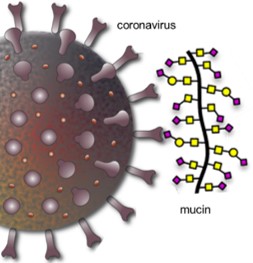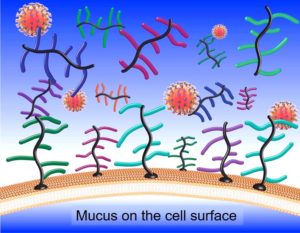Mucus and saliva may prevent the spread of coronaviruses through contaminated surfaces, according to a new study lead by Dr. Jessica Kramer.
People produce different forms of mucus and salivary proteins, called mucins, depending on their unique genetics, diet and environment. Certain forms of mucins form a barrier around the live virus which prevents the spread of infection. In a laboratory setting, the research team tested two transmission modes: direct contact, such as touching, kissing, or a nearby sneeze, and infection from touching a contaminated surface. Coronaviruses mainly spread through transfer of mucus or salivary fluid from an infected person to a new host.

“Results of this study could help predict who is most at risk for contracting or spreading coronaviruses, and may assist in designing new drugs that similarly block infection,” said Dr. Jessica Kramer, University of Utah professor and lead author of the study.
Link to Dr. Kramer’s Lab Webpage: https://my.eng.utah.edu/~jessicak/index.html
Many prior lab studies throughout the pandemic reported that coronaviruses are viable on surfaces for days or even weeks. However, these studies examined virus in water or a buffer rather than salivary fluid. Kramer’s team corroborated that without mucins, the coronavirus was viable and infected cells after recovery from a variety of common touch surfaces, including plastic, glass, steel and surgical masks. Virus samples were infectious even after sitting dry on plastic for several days. However, when scientists recovered virus dried in simulated sneeze droplets with mucins, infection was essentially eliminated. This was true whether the virus had been dried for 5 minutes or 3 days. Mucins also protected against infection from direct contact.
“Epidemiologists generally agree that surface transmission is low,” said Kramer. “Our research finally explains why lab studies that predicted high rates of surface transmission failed to actualize.”

Kramer’s team probed how the mucins took action. Mucins are a special class of proteins that have sugars attached to them. When the research team removed the sugars, mucins were no longer protective. They showed that coronaviruses can attach directly to mucins. The mucins act as a decoy to bind and trap the virus before it gets to the cells underneath. Additionally, some animals have different sugars attached to their mucins than humans. Mucins that could protect against a human coronavirus could not protect mouse cells against a mouse coronavirus.
Link to Study: https://pubs.acs.org/doi/10.1021/acscentsci.1c01369